'Rings of Power' Episode 3 Is Astounding, and Full of Violent Delights
We’re not in Middle-earth anymore, Toto. On this week’s episode of Rings of Power, we’re making landfall on the splendid shores of Númenor. This rendering of Tolkien's fabled Land of Gift is appropriately magnificent: striking in its scale, glittering with gilded details, and rich in mythology we’ve never encountered on-screen until now. But before we can get too comfortable here, Rings of Power pulls us back down to earth. Better yet, it grinds our faces into the mud, setting another thread of this week’s story in a Southlands work camp run by brutal orcs. We’re breaking down the entire episode, including what we loved and what we can’t stop wondering about.
And the Rings of Power Go To….
Galadriel
The Lady of Light once again tops our Olympic pyramid, if only for this epic burn: “Who is this mortal who speaks to me as if he has the slightest idea who I am?” Mark my words, it’s the new, “I would cut off your head, dwarf, if it stood but a little higher from the ground.”
Galadriel washes up on Númenor’s shores long after a serious ideological schism has divided the kingdom. In the early days of the Second Age, Númenoreans and elves sailed freely between one another’s lands, exchanging gifts, knowledge, skills, and stories. But as Númenor grew in wealth and power, so too did it grow in hubris, with some of its inhabitants becoming bitterly envious of the immortality enjoyed by the elves and the gods (known as the Valar). Ultimately, the kingdom split into two factions: the King’s Men, who rejected friendship with the elves and allegiance with the Valar, and the Faithful, who remained devoted to their religious practices and their Elvish neighbors.
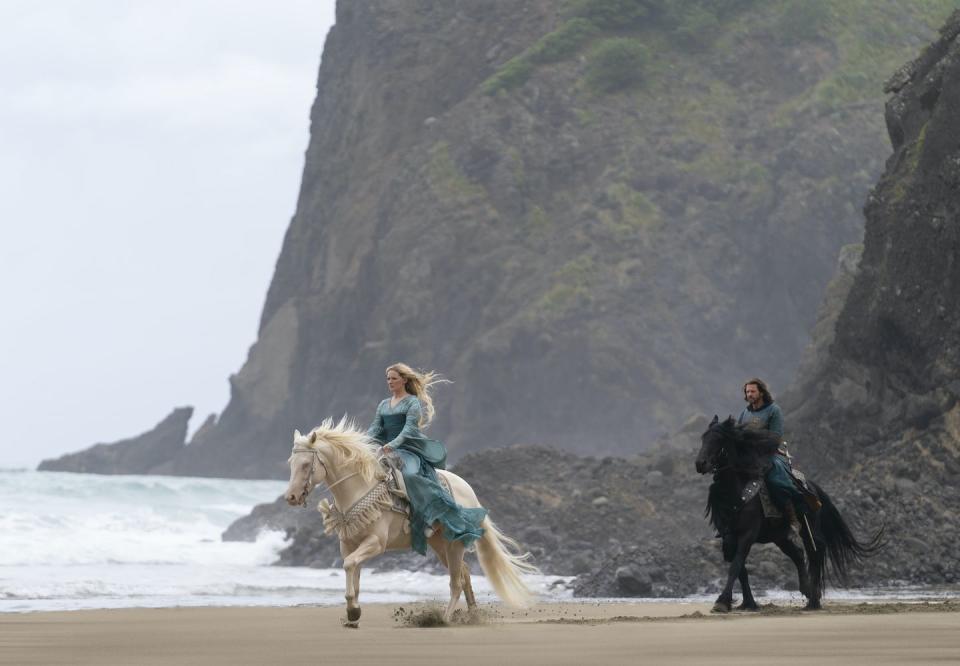
Galadriel couldn’t be arriving at a worse time, now that elves have been unwelcome on these shores for generations. But our girl won’t be intimidated—when asked to introduce herself by Queen Regent Miriel, she provides a title-heavy answer worthy of Daenerys Targaryen: “Galadriel of the Noldor. Daughter of the golden house of Finarfin. Commander of the Northern Armies of High King Gil-galad.” (I guess she didn’t get the memo that Gil-galad basically fired her when he shipped her off to Valinor.) Galadriel has a lot of memorable moments this week, from leaping across rooftops to making waves in the throne room, but it’s her seaside horseback ride that truly delighted me. Galloping down the coastline, her face peeled open with euphoria, it’s a moment of adventure, wonder, and pure Tolkien magic.
Halbrand
Galadriel’s buddy Halbrand spends most of this episode brawling in alleyways and sucking up to Númenorean power-brokers, but Galadriel sees right through his folksy disguise. Remember back in Episode One when an angry teen in the Tirharad tavern revealed that the Southlands once had a king? After a little trip to the Hall of Law, Númenor’s very own Library of Alexandria, Galadriel has solved that mystery: “Your people have no king, for you are him,” she says to Halbrand. Halbrand, for his part, wants nothing to do with his royal lineage; as he reminds Galadriel, his ancestors were corrupted by Morgoth. The rightful but reluctant king in hiding: where have we heard that one before? I get big Aragorn vibes.
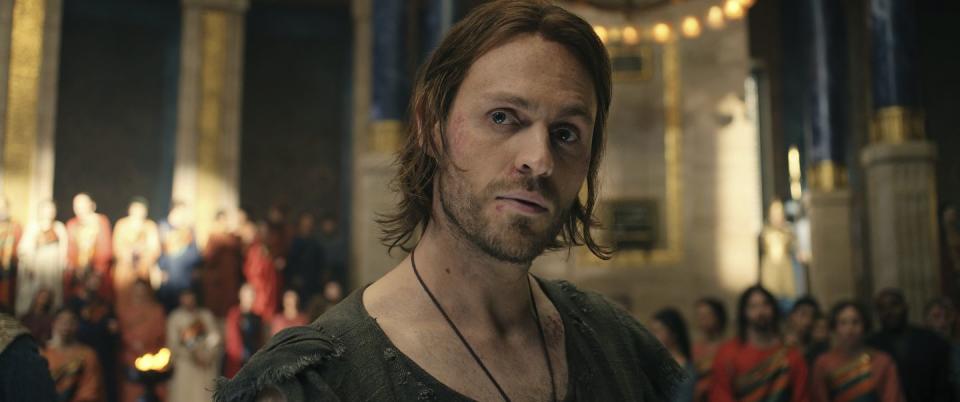
It’s worth noting that Rings of Power is going off-book here: there’s no Tolkien lore about royals in the Southlands. But as Galadriel and Halbrand converse across the bars of his prison cell, we get a clue about where his story may be going. Looking at the royal crest on his pendant, she observes, “Many ages ago, a man bearing that mark united the scattered tribes of the Southlands under that banner—the very banner that might unite them again today against the evil that now seeks to claim their lands.” Sure, Halbrand’s ancestors were fighting for the wrong side, but it sounds like destiny is calling him to change their fate.
Elendil
When Galadriel and Halbrand’s savior introduced himself as Elendil, no doubt ears perked up across the land. Even casual fans of the Peter Jackson movies know this gentleman—remember the stately king from Galadriel’s Fellowship of the Ring prologue, leading his people into battle during the Last Alliance of Elves and Men? That was Elendil. His useless son Isildur was there too, ushering in the near-doom of Middle-earth when he failed to destroy the One Ring. But for now, Elendil is just a captain among Númenorean seafarers, and Isildur is just a dreamy teenager failing to live up to his father’s expectations. Big things lie ahead for these characters, and I, for one, can’t wait to see it all unfold.
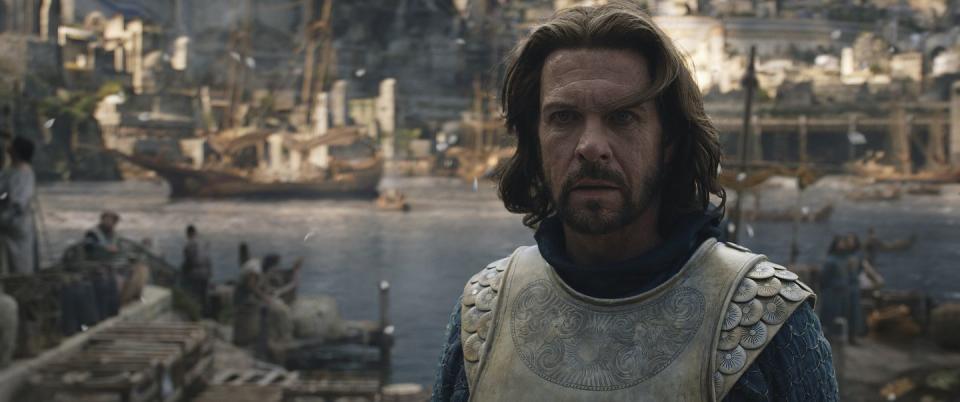
Arondir
This week, I’m giving out a special Ring of Power for the most kickass stunt work, and it’s going to Arondir. This guy is out here slinging his body around spears, chains, and rabid wargs like he’s Neo dodging bullets in The Matrix. Meanwhile, Galadriel’s discoveries in the Hall of Law provide major clues about where Arondir’s story is going. The Mark of Sauron, she learns, isn’t just a sigil—it’s a map of the Southlands accompanied by “a plan by which to create a realm of their own, where evil would not only endure, but thrive.” Now it all makes sense—those underground tunnels Arondir was exploring, and the orc chain gang he’s working on now? It’s all got to do with the construction of Mordor. Geographically speaking, the Southlands lie where Mordor will eventually be located. We know from the lore that Arondir can’t stop the tide of evil from taking root here, but based on his spirited defense of the elves and humans enslaved alongside him, he’s sure going to try like hell.
By Durin’s Beard, What Was That?
Who Is Adar?
In the final seconds of the episode, Arondir is dragged before someone named Adar. As the orcs chant “Adar” and bow in deference, someone moves into the blurred-out frame, dark-haired and pale with what look like pointy ears. It could be Sauron (Adar does mean “father” in Elvish, and he’s certainly a father figure to these creatures), but it seems awfully early for Rings of Power to reveal its Big Baddie (and awfully strange for him to be slumming it in these trenches). Canonically speaking, no elf ever fought under Morgoth or Sauron’s banner, but Sauron did capture a company of elves during the First Age’s War of Wrath. Given what Galadriel discovered about Sauron’s black magic in the Northernmost Waste, it seems entirely possible that Sauron could torture or bewitch these elves into becoming leaders of orcs.
What’s Up with The Stranger?
Back in Harfoot-land, Nori’s secret is out: the community has discovered The Stranger, and they’re not happy about this uninvited guest. For Nori’s transgression of inviting an outsider into the community, the Brandyfoots are sentenced to walk at the back of the caravan when the Harfoot migration begins. With Nori’s father Largo still recovering from a broken ankle, the Brandyfoots won’t be able to keep pace with the caravan, meaning that they’ll be abandoned in the wilderness to fend for themselves. But The Stranger tags along, plaintively muttering the word “friend” as he gazes at Nori, and soon enough, he’s pressed into service pulling the family’s wagon. Last week, I theorized that The Stranger might be Sauron, but this week, he seems rather emotionally fragile and innocent, so I’m leaning more toward my other theory that he could be Gandalf (or another wizard). Whoever he is, watching him melt the hearts of Nori and her parents melted my heart, too. People from different walks of life coming together across their differences—it’s textbook Tolkien! As Nori puts it, “He helps us and we help him.”
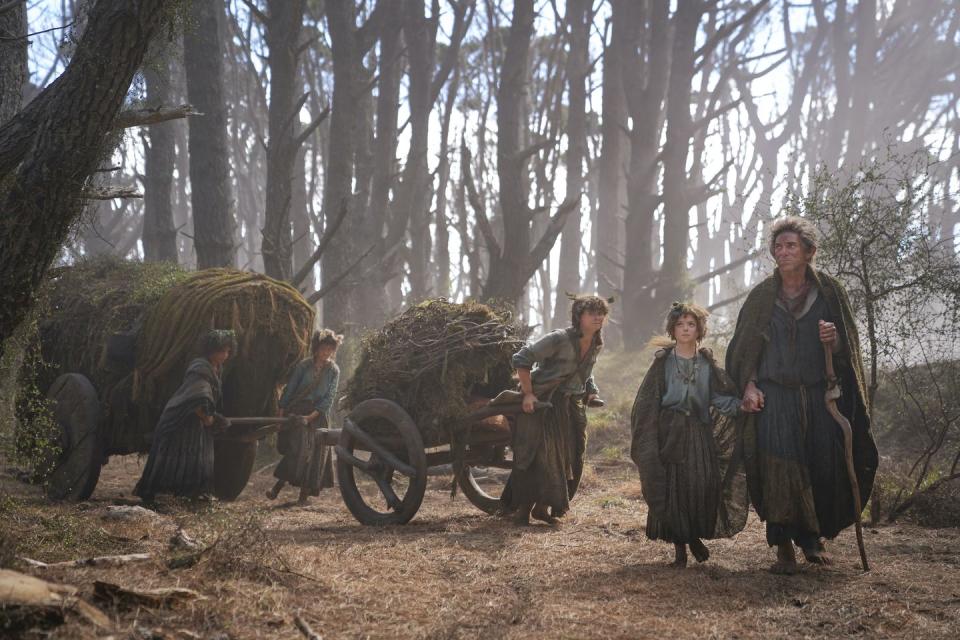
Sights More Beautiful Than the Silmarils
This week’s easter eggs both have to do the lineage of the House of Elros. When Galadriel and Elendil travel to the Hall of Law in Andúni?, she discovers that the library was assembled by “Elros himself.” Elros, Tolkienheads know, was the founder of Númenor and the brother of Elrond. With dual human and elven heritage, these twins were given their choice of kindred. Elrond chose to belong among the elves, while Elros chose the race of men—and consequently lived a long, but ultimately mortal life. Gazing at a tapestry of the brothers, Galadriel describes Elros as “an uncommon spirit,” saying, “But I was always closer with his brother.”
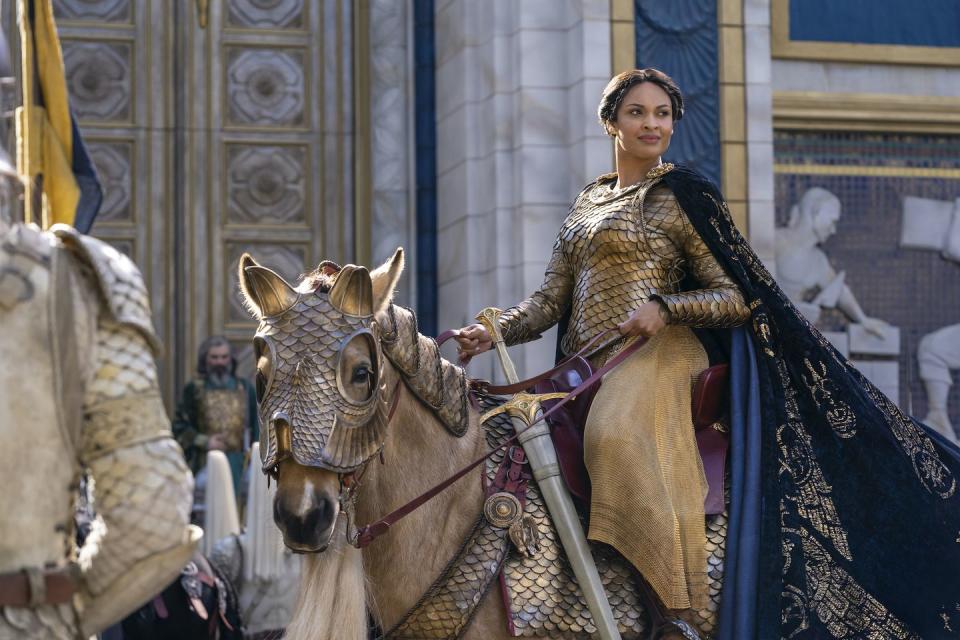
Elsewhere in Númenor, one of Elros’ descendents is thinking about lineage, too: Queen Regent Miriel, whose Chancellor Pharazon advises her to take strong action against Galadriel, saying, “We dare not invite your father’s cloud back overhead.” Miriel’s father is the deposed, but still-living king: as Elendil describes him, he is one of the Faithful, forced to live “as an exile in his own kingdom” after the King’s Men chased him from the throne. Miriel presents herself as one of the King’s Men, but given her heritage, I’m not counting her out as a secret Faithful sympathizer just yet. Near the episode’s end, she ascends a grand tower and enters a secret chamber, saying to someone we can’t see, “It is here, Father. The moment we feared. The Elf has arrived.” Canonically speaking, Miriel’s father Tar-Palantir has the gift of foresight—just what does he know? Is Galadriel part of some prophecy? Does her arrival mean that tensions between these two factions will finally reach a breaking point? Next week, we may find out. Stick with us—we’ll be back with another recap when Episode Four airs.
You Might Also Like
